- Home
- David R. George III
Crucible: Kirk Page 15
Crucible: Kirk Read online
Page 15
He said none of those things. Instead, he told her simply, “I’m sorry it has to be like this.”
“You should be,” Antonia said quietly, seeming to deflate before his eyes. Then she turned, took two steps, and started down the stairs. Kirk listened to her footfalls, then heard the front door open and close.
He felt terrible for what he had done, but there had been no choice in the matter. His mistake hadn’t been in returning to Starfleet, but in getting involved so seriously with Antonia in the first place. He had lost sight of the fact that true love had already passed him by and that it would not come his way again. For that, Antonia had paid a hard price.
Kirk never saw her again.
THIRTEEN
2293
Even as the airpod skimmed evenly past fields that looked as though they had until recently been filled with wheat, Scotty sat at an auxiliary panel, checking engine performance. Habits become nature, Jim Kirk thought, recollecting the old Chinese proverb. As though he needed additional proof of the maxim, Chekov sat to his right at the forward console, working the navigational controls. “I thought you were waiting for an exec position to open up,” Kirk said, looking at Pavel. Then he pointed over at Scotty and added, “And I thought you retired from engineering.”
“Ach,” Scotty scoffed in his Gaelic way. “I retired from Starfleet. I’ll always be an engineer.”
“What was I thinking?” Kirk said with a smile. It surprised him how good it felt to be with his two old friends. When he’d made the decision to leave the space service, he’d believed that the time had been right. The Enterprise had been decommissioned, many of his command crew had been ready to go their separate ways, and politics had more than ever insinuated itself into his job, but he’d also felt that he’d needed, in some regard, to get on with his life.
That hadn’t been the first time that Kirk had reached such a point. He’d stepped away from Starfleet once before, retreated to his property in Idaho, and ended up becoming involved with Antonia for two years. He hadn’t found whatever he’d needed at that time, but neither had he found it when he’d gone back to the service.
And so Kirk had decided to try again. After retiring this second time, he’d begun filling his days and nights with many of the activities that he hadn’t had the opportunity to pursue over the years. Doing so had entailed journeying to various unique locations throughout the quadrant, and doing so as a civilian had proven different and interesting in and of itself.
Kirk had enjoyed all that he’d done during the past months, and he fully expected to feel the same about orbital skydiving today. After he’d learned that Scotty and Chekov would be joining him for the Enterprise-B launch tomorrow, he’d decided to invite them along today for his unusual exploit. They’d agreed to survey the landing site this morning, and they would greet him there later in the day for his touchdown.
Their presence in the airpod right now, and the satisfaction Kirk found in simply being with them, underscored how much time he’d spent alone since he’d begun his retirement. He had stayed by himself intentionally, believing that he needed to separate from his old life in order to determine how best to move on from here. But lost amid his frenetic schedule and the solitude he’d sought for self-reflection, he hadn’t realized how much he missed his old friends.
He did now.
Kirk turned and peered out through the forward viewport. In the early morning light, a dirt path passed below the airpod, with freshly reaped fields slipping by on either side of the small craft. Ahead, he saw a slight rise, and atop it, a pair of tall stone markers. “Is that it?” he asked Chekov.
“I think so,” Pavel said, consulting a readout on his panel. “Yes, that should be the western perimeter of the landing zone.”
“Excellent,” Kirk said as the airpod began up the gentle slope. Chekov slowed the craft as they approached the markers, bringing it to a floating stop once they arrived there. “How large is it?” Kirk asked.
“Approximately two kilometers square,” Chekov read from his instruments.
Kirk nodded. “Why don’t you take us to the center of the area?” Chekov operated his controls, and a short time later, he once more brought the craft to a stop, this time setting it down in the panic grass. Kirk stood up, leaned on the console, and peered out left, center, and right. “Doesn’t really look like much, does it?” he said.
“I don’t suppose it has to,” Chekov said, standing up beside him and gazing out.
“It wouldn’t make a bit of difference if this field was made out of Kerlovian foam or cast rodinium,” Scotty said, suddenly appearing between Kirk and Chekov. “If you don’t execute reentry just right, either one would leave you a puddle of flesh.”
“Thanks for the vote of confidence,” Kirk said. “Now I know how you motivated your engineering teams all these years.”
“Don’t blame me,” Scotty said. “You’re the one running a bloody decathlon across the galaxy.”
“‘A ship in harbor is safe,’” Kirk quoted, “‘but that is not what ships are built for.’” He paused, then dryly asked, “Are you sure you don’t want to make a jump yourself?”
“The only jump I plan on making,” Scotty said, “is into my boat once I reach the Norpin Colony.”
“He says that now,” Chekov cracked, “but I bet less than a week after he arrives there, he’ll be working on the colony’s generators or power grid or transporters.”
Scotty looked at Pavel with an expression that seemed to indicate that he’d taken offense at the comment, but then he said, “Only if the equipment needs it.” Without waiting for a response, he turned and opened the airpod’s hatch. Kirk glanced over at Chekov, who smiled in obvious amusement at Scotty’s remark.
After the engineer had exited, Chekov and then Kirk followed him outside. The clean, slightly sweet scent of wheat filled the air, the aroma at once calling to mind his childhood. He didn’t fight to suppress the memories, as he so often did, but let them settle within him. “When I was a boy,” he said, “the air in certain areas around town would smell like this.” He breathed in deeply, and the three men stood quietly for a few seconds, taking in their surroundings. Finally, Chekov pointed off to one side.
“There,” he said. He walked ten meters, then squatted and waved away some of the panic grass, uncovering a squat cylinder that rose about half a meter from the ground. “This is your homing beacon.”
Kirk walked over and examined the device, which appeared well anchored in the ground. He strolled around it, then leaned down when he saw a small access panel on one side. He pushed it and it glided open, revealing a thumbprint scanner, a single control, and a small display. Kirk placed his thumb on the pad and a ray of light immediately shined across it. Almost at once, the words ORBITAL SKYDIVER—IDENTITY CONFIRMED appeared on the display, and the control came to life with a red glow. As he’d been instructed when he’d signed up for his jump, Kirk pressed the button. The readout blinked and read PERFORMING DIAGNOSTIC. He waited until the color of the control changed from red to green, indicating the functional status of the homing beacon. The display also confirmed the successful completion of the diagnostic.
“All set,” he said, swinging the access plate closed and standing back up. Chekov rose as well.
“That’s it?” Scotty blustered. “You really ought to let me have a look at that equipment.”
“And how long would that take?” Kirk asked, playing along with the engineer.
“I could have it running at maximum efficiency in six hours,” he said.
“It’s a miracle that we could ever plan on the Enterprise making it from one planet to another in less than a year,” Chekov gibed.
“Engineers,” Kirk said with a shrug. “Just wait until you make captain and have a chief engineer of your own, Pavel.”
“Do you think they’ll let me do without one?” Chekov joked.
“Somebody’s got to be aboard to keep you command types from blowing up the ship every five
minutes,” Scotty said in mock indignation.
“Well, that’s true,” Chekov said. “At least in your case, Captain.”
“Now, now,” Kirk said. “I only destroyed the Enterprise once.”
“Not for want of trying to do it more often,” Scotty said. “There was the time when the Kelvans hijacked the ship when you ordered me to rig the ship to explode on your order.”
“There was also the time when Bele and Lokai came aboard,” Chekov said.
“And then there was the time—” Scotty began, but Kirk interrupted him.
“All right, all right, I give,” he said, holding up his hands before himself in a pose of surrender. “Well, I guess I should be on my way to Tunis.” Together, they all started back to the airpod, and Chekov flew them back into Wichita.
When they’d returned to the public transporter at which they’d all arrived earlier, Kirk said, “So I’ll see you gentlemen out at the landing zone this afternoon?”
“Four forty-nine,” Chekov confirmed. “We’ll be there.”
“Good,” Kirk said. “I’ll see you then.”
Chekov beamed away first, heading back to San Francisco, and then Scotty transported out to Aberdeen, Scotland, where he’d been living since beginning his own retirement. As Kirk stepped up onto the platform, he thought again about how much he’d enjoyed seeing his old friends. As much as he’d been anticipating his orbital skydive today, he now thought that he looked forward even more to the dinner that he and Scotty and Pavel had planned on having together this evening.
After I get back from the Enterprise launch tomorrow, Kirk thought, I’m going to contact Spock and Bones. McCoy had actually reached him last week, but Kirk hadn’t really said much, other than to tell his friend about agreeing to participate in the Enterprise-B ceremony. That’s got to change, Kirk thought. He realized that he really needed to reconnect with his friends.
At the console across the room, the transporter operator signaled his readiness, and Kirk nodded in reply. The operator worked his controls, and the hum of the transporter grew, bringing with it the blue-white light of dematerialization. Moments later, Kirk was not in Kansas anymore.
Kirk set down the carryall in the den of his counterpart’s San Francisco apartment, then squatted down and hunted through it until he found the blue data card he’d brought back with him from his days in Idaho. He took it to the computer terminal, where he sat down and inserted it into an input/output receptacle. He wanted to review one last time the message he’d recorded, since once he left here today, he wouldn’t have an opportunity to safely do so again.
On the display, his own face appeared. “Jim,” the message began, and as he implored the earlier version of himself to listen to the entire recording before taking any action, the strangeness of the situation struck Kirk. He had traveled in time before, but never had it resulted in such peculiar circumstances as these. It did once for Spock, though, he thought, remembering when his friend and first officer had leaped into his own childhood in order to save himself as a boy.
“I am you, but at a future date,” his message continued. “To make and leave you this recording, I arrived here through the Guardian of Forever. Because I am you, I know what the mere mention of the Guardian does to you, even after all these years.” Kirk knew that mentioning the time vortex in that way would have an impact on his alter ego.
When he’d finished watching the complete message and found himself satisfied with it, Kirk removed the data card and set it aside. He then accessed the Earth comnet and opened a transmission. After a few seconds, the Starfleet emblem faded in on the empty screen, replaced in the next moment by the face of Admiral Sinclair-Alexander’s assistant. “Captain Kirk,” the young ensign said. “May I help you with something?”
“I’d like to speak with the admiral,” he said.
“Admiral Sinclair-Alexander is in a meeting and therefore unavailable at the moment,” the ensign said. Kirk could not recall her name. “May I ask what this is in regard to?”
“The launch of the Enterprise tomorrow,” he said, aware that when Sinclair-Alexander heard why he had contacted her, she would be concerned that he had changed his mind about attending the ceremony. Kirk remembered that when she had invited him in the first place, he had not particularly wanted to do as she’d asked.
“Is there anything that I can help you with?” the ensign wanted to know.
“No, thank you,” Kirk said. “I really would like to discuss this with the admiral. The sooner, the better.”
“Very well,” the ensign said. “I’ll inform her as soon as she’s out of her meeting.”
“Pardon me,” Kirk said, “but do you have any idea when that will be?”
The ensign glanced away from the screen for a moment, doubtless consulting a chronometer. “In just a few minutes,” she said.
“Then if it’s all right with you, Ensign,” Kirk said, “I’d like to wait.”
“Very well,” she said. “Is there anything else, Captain?”
“No, that’s it,” Kirk said. “Thank you, Ensign.”
“My pleasure, Captain,” she said. “I’ll place you on standby then.” Kirk nodded, and the ensign reached forward to a control. The Starfleet emblem returned to the display. This time, beneath it, read the words:
OFFICE OF ADMIRAL MARGARET SINCLAIR-ALEXANDER, STARFLEET COMMAND
ENSIGN ELISA TEAGARDEN, ASSISTANT TO THE ADMIRAL
Teagarden, Kirk thought, remembering the name once he saw it. He waited for eleven minutes before the ensign’s face reappeared on the monitor. “Captain Kirk,” she said, “the admiral will speak with you now.”
“Thank you,” Kirk said, and then Sinclair-Alexander’s face replaced Teagarden’s on the screen.
“Jim,” she said at once, “please don’t tell me you’re canceling for the Enterprise ceremony tomorrow.”
“No, against my better judgment, I’m still planning on being there,” Kirk said, hopeful that the admiral’s concern and her awareness of his reluctance would make her more receptive to granting the request he would now make of her. “Unless there’s some reason that you think I shouldn’t,” he japed.
“No, no, not at all,” Sinclair-Alexander said. “Forget I even mentioned it. So what can I do for you, Jim? Ensign Teagarden said that you did want to talk about the launch.”
“Not precisely about the launch,” Kirk allowed. “But you promised me a tour of the ship tomorrow.”
“That’s right,” the admiral said. “Is there a problem with that?”
Kirk recalled the meeting he’d had with Sinclair-Alexander when she’d asked him to attend the launch and first voyage of the Enterprise-B, a meeting she’d had with his earlier self just a few days ago. “Actually, I’m looking forward to seeing the ship,” he said. “I’m just not much interested in being rushed through it with the press at my heels or being ushered around like a plebe who’s never seen the inside of a starship before.”
“Jim, the whole point of having you on board the Enterprise is for the positive public relations,” Sinclair-Alexander said. “It really would be counterproductive to that end to bar the press from accompanying you on your tour.”
Kirk had not only anticipated such a response, he’d counted on it. “What about a separate tour?” he asked.
“The schedule is very tight tomorrow,” said the admiral. “I’m not sure that we could fit anything more in.”
“That’s why I was thinking that I could do it today,” Kirk said. “I mean, I’ll still go with Scotty and Chekov through the ship tomorrow for the sake of the publicity, but if I went up today, I could take my time and really get a good look around.”
“We’ve only got a handful of personnel on board right now,” Sinclair-Alexander said, “and most of them are engineers trying to get the ship ready for the launch. You’d really have to be on your own.”
“That’d be perfect,” Kirk said. Although he could have accomplished what he needed to with an escort by
his side, not having one would make his task easier.
“All right,” the admiral said. “Let me get you reactivated today then.” She looked away for a second, then asked, “How does noon sound?”
“That’ll be fine,” Kirk said.
“You can report to any of the transporters here at Starfleet; they’ll send you up,” Sinclair-Alexander said. “I’ll inform the officer of the deck that you’ll be coming. Anything else?”
“That’s it, Admiral. Thank you,” Kirk said. “It should be interesting.”
“Enjoy yourself, Jim,” Sinclair-Alexander said. She touched a control and the Starfleet insignia showed once more, then disappeared in favor of the Earth comnet logo.
As Kirk reached to shut down the terminal, he suddenly saw a light flashing on the console, indicating that he—or rather, his counterpart—had received a message. He thought back to the day before the Enterprise-B ceremony, to when he’d gone orbital skydiving, and he tried to remember whom he’d heard from when he’d gotten home that night. Unable to recall a single message from that day, he quickly tapped a button to play it. When the sender’s face appeared on the display, Kirk felt his mouth drop open.
“Hi, Jim,” said Antonia.
To Kirk, she looked much the same as when last he’d seen her, which had been when she’d walked out of his vacation home up in Canada. The lines around her mouth had grown more defined and a few wrinkles had begun to show at the sides of her eyes, but she still wore her hair long and looked as attractive as ever. It stunned him to see her.

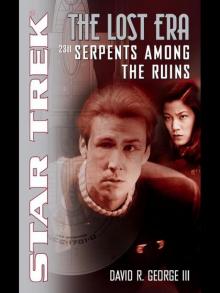 Serpents Among the Ruins
Serpents Among the Ruins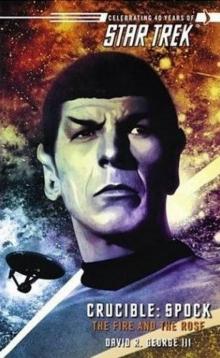 The Fire and the Rose
The Fire and the Rose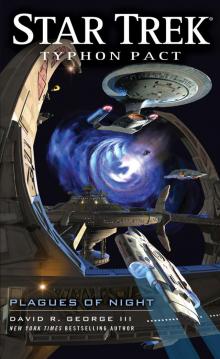 Star Trek: Typhon Pact 06: Plagues of Night
Star Trek: Typhon Pact 06: Plagues of Night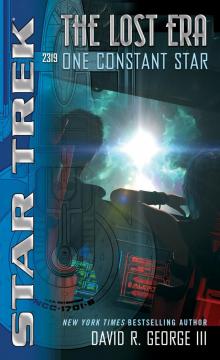 Star Trek: The Lost Era - 08 - 2319 - One Constant Star
Star Trek: The Lost Era - 08 - 2319 - One Constant Star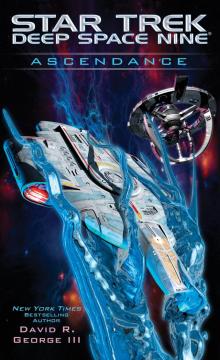 Star Trek: Deep Space Nine: Ascendance
Star Trek: Deep Space Nine: Ascendance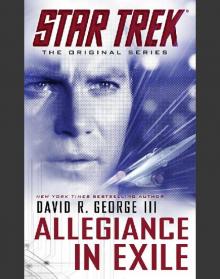 Star Trek: TOS: Allegiance in Exile
Star Trek: TOS: Allegiance in Exile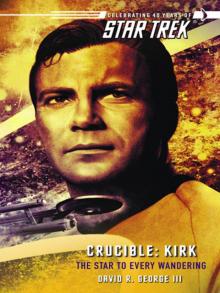 Crucible: Kirk
Crucible: Kirk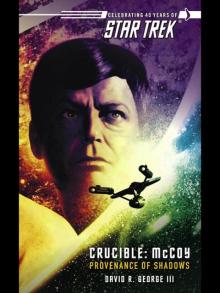 Crucible: McCoy
Crucible: McCoy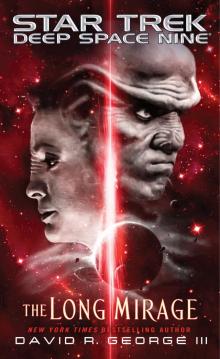 The Long Mirage
The Long Mirage Original Sin
Original Sin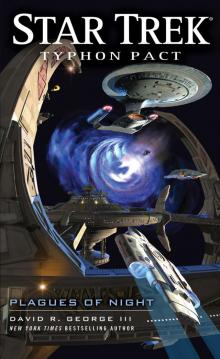 Star Trek: Typhon Pact: Plagues of Night
Star Trek: Typhon Pact: Plagues of Night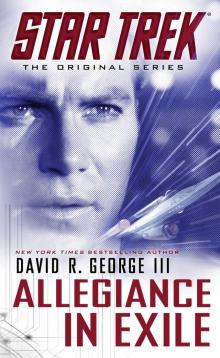 Allegiance in Exile
Allegiance in Exile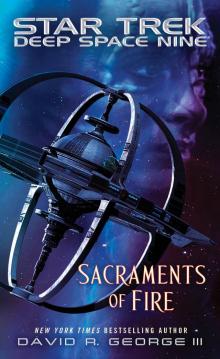 Sacraments of Fire
Sacraments of Fire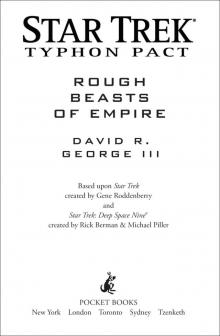 Star Trek: Typhon Pact: Rough Beasts of Empire
Star Trek: Typhon Pact: Rough Beasts of Empire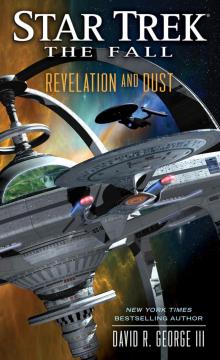 Star Trek: The Fall: Revelation and Dust
Star Trek: The Fall: Revelation and Dust